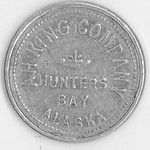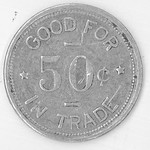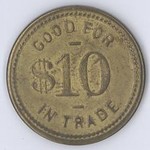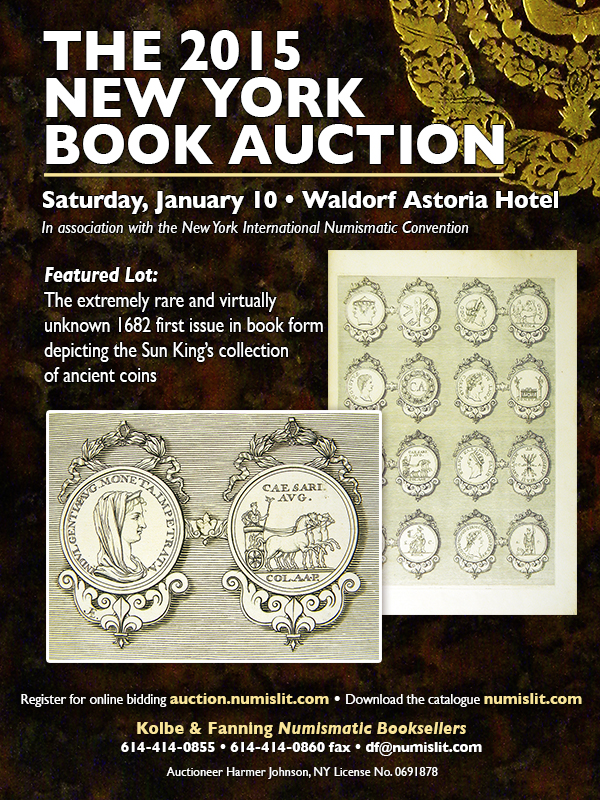
PREV ARTICLE
NEXT ARTICLE
FULL ISSUE
PREV FULL ISSUE
ALASKA SALMON CONTRACTOR TOKENS: AH KINGI like salmon. At my request editor Bill Hyder forwarded me text and images for a nice article by Kaye Dethridge and Irene Shuler on
Alaska Salmon Contractors and their Tokens. Their paper was originally part of the “Life, Influence and the Role of the Chinese in the United
States, 1776-1960” by the Chinese Historical Society of America. Hyder published it in the July/August issue of the TAMS Journal, the official
publication of the Token and Medal Society. Here's an excerpt which deals with the tokens of AH King. -Editor
Alaska and gold run hand in hand. Much has been written about the stampedes to Alaska for gold in the early days, rekindled today by modern real-life television series. But until the development of the massive Alaskan oil reserves in the 1970s, fishing and the dirty work of butchering and canning salmon was the number one money-making industry in Alaska. Simply put, Alaska’s fish feed the world, and have for centuries. Collecting Alaska tokens can be very different from collecting tokens from other regions in America. One example is the Alaska fisheries cannery tokens. There are tokens known from 25 different cannery companies from 23 different Alaska towns, some in a variety of denominations. An additional six cannery companies issued paper tokens. Curiously, there are also associated fisheries and clam companies that issued metallic tokens, which account for seven more different companies.   Some of these tokens are among the most desirable of all Alaskan tokens and bring very high prices. A 50c token from the North Pacific Trading and Packing Company’s Klawock cannery sold for $3,150.00 in October, 2013, an extremely high sales price for an Alaskan token without a gold nugget. Interestingly, this token is one of the very few tokens from Alaska with incuse lettering. Commercial fishing in Alaskan waters has gone on for millennia. Fish and furs from the northern region were in great demand from both sides of the Pacific Ocean. The need for fish as food to feed the appetites of Russia, Asian countries, and the Americas is an international political problem. Fishing fleets found the rich Alaskan waters and began harvesting their catch. The easiest way to preserve the fish was at first through salting. As technology improved, canneries came into play, necessitating factories and a labor force that did not exist in the remoteness of Alaska. Indeed, anything on two legs was mining gold. A labor system developed over time involving labor contractors, usually Asian, who supplied workers to the fish factories. The tokens of one such contractor, Ah King, have been misidentified for some time. Ah King, a well-known Chinese labor contractor, immigrated to the United States in 1877 and worked as a water boy during construction of the Central Pacific Railroad. By being very frugal, he was able to start his own business in Seattle dealing with general merchandise, herbs, and imported items. His business place soon became a center for Chinese men looking for work. At this time he had six contracts with Alaska canneries.     One cannery he had a contract with was the Hunters Bay cannery in Southeast Alaska. He issued tokens for use at this cannery in the denominations of 10c, 25c, 50c and $1.00 in aluminum and $5.00 and $10.00 in brass. I assume there was a 5c piece but it is not known if any of these survived. According to Ms. Angela Yee, these were paid to the workers at the cannery site and were later redeemed in Seattle for U. S. coinage when the season ended. Ah King was a very successful businessman and on a business trip to Sacramento in September 1915, he was found dead in his hotel room. A mystery remains as to whether it was murder or suicide. The Ah King Company continued operation by his son as evidenced by the 1916 date on the Ah King token listed under Juneau in Benice’s Alaska tokens book. For more information on TAMS, see:
 Wayne Homren, Editor The Numismatic Bibliomania Society is a non-profit organization promoting numismatic literature. See our web site at coinbooks.org. To submit items for publication in The E-Sylum, write to the Editor at this address: whomren@gmail.com To subscribe go to: https://my.binhost.com/lists/listinfo/esylum All Rights Reserved. NBS Home Page Contact the NBS webmaster 
|